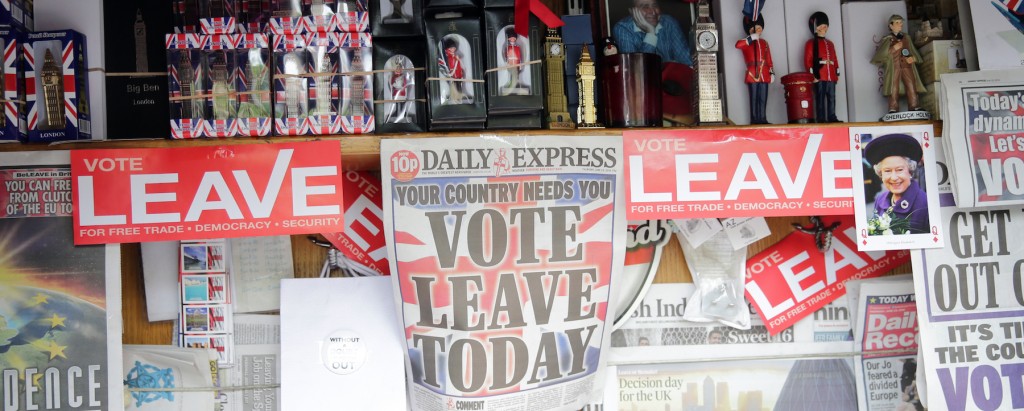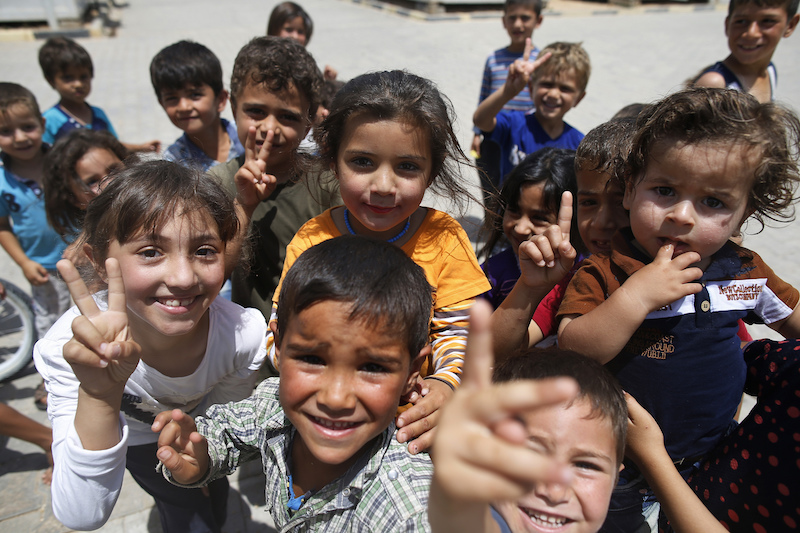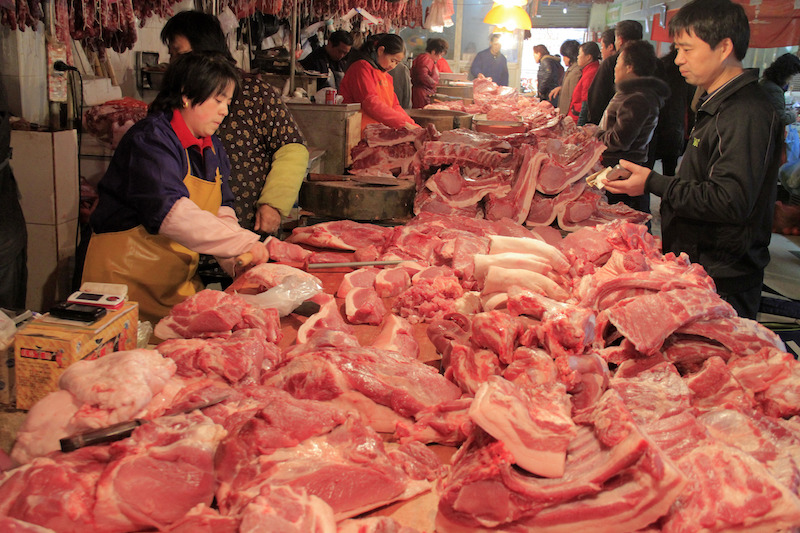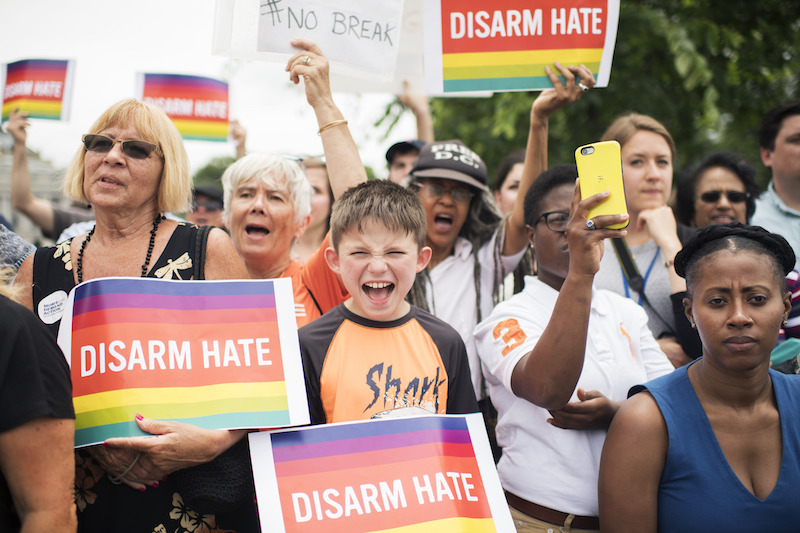
Brexit, refugees and Senate sit-ins. 18-24 June: what just happened?
So long, farewell, auf wiedersehen, goodbye. It’s official, the UK is saying adieu to the European Union
After yesterday’s referendum vote, Britain has opted to leave the European Union, with around 52% wanting out and 48% wanting to stay. Here’s our take on what this means for people’s pockets, the pound, trade, and economics itself (though there's so much speculation about this that by the time you read it, there’ll be a million other predictions out there saying differently!) After a fierce campaign involving all sorts of fear-mongering rhetoric like ‘economic insanity’, ‘breaking point’, and ‘DIY recession’, it was a close fight to the very end. There’s a clear demographic split between old and young, with 69% of people over 65 voting out and 69% of 18-25s voting in. There’s also a class divide at play, with some saying that a vote for leave is in a sense a protest vote against the establishment. The thing that sticks out to us most from the campaign is how people feel about the language that was used to debate it – we asked shoppers in Southend how they felt, and what came across was that they just didn’t know who to trust. What happens now is anyone’s guess. For some, the future feels a bit scary, for others full of promise. For British Prime Minister David Cameron, who's just resigned, it might be time for a holiday.
This is hard to get your head round, but apparently one in every 113 people in the world is now a refugee

The number of people displaced by conflict around the world has reached a total of 65.3 million, according to the latest figures released by the UN. That’s the highest number in human history! It includes all refugees, asylum seekers or those displaced in their own countries at the end of 2015. Over half the total comes from just three countries: Syria, Afghanistan and Somalia, which have faced years of conflict. And while immigration to Europe is making the news a lot recently, it’s countries like Pakistan, Lebanon and Turkey that host the largest numbers. Strangely enough, a lot of people strongly overestimate the amount of refugees their country has taken in, while underestimating the amount there actually are worldwide, which goes to show how skewed our understanding of the scale of this refugee crisis really is. Immigration and its effect on economies is a huge topic in political debates around the world; the truth is, it’s actually really difficult to measure. This article in The Economist suggests the two sides - the amount spent on benefits in the short term and the amount collected in tax over the long term - eventually balance each other out. And beyond the arguments of whether or not it benefits a country financially, we need see that there are now 65 million people in the world who have been forced out of their homes, and need help.
Fifty years and 220,000 lives later, a ceasefire in Colombia might be around the corner

Anyone seen Narcos? Well, Colombia might be moving one step further away from that drug lord-led image – the Colombian government and FARC (The Revolutionary Armed Forces of Colombia) have signed a ceasefire agreement this week which could bring the civil war that’s been raging for the past 50 years to an end. Not so fast though: first, the terms need to be agreed, and then the government needs to hold a referendum to see whether Colombians are up for the arrangement. FARC emerged as a rebel group looking to lead a Cuban-style revolution and install a Marxist-led government in Colombia. They’re infamous for funding their insurgency on drug trafficking and ransom kidnappings. The US has donated billions of dollars of counterinsurgency aid to help fight the FARC, and it might just be paying off. As well as the obvious benefit of bringing about peace to a country that’s been torn apart by conflict for so long, some people are saying that the deal could increase investors’ confidence in Colombia and bring more jobs and money in the country. At the same time, implementing peace won’t be cheap, considering how much damage the war has done. Colombia still relies quite heavily on oil, coffee, and sugar, but it’s actually becoming a tech powerhouse, with Google, Facebook, and Microsoft opening offices in the capital, Bogota, in the past year. So who knows: things might be about to change.
In China it’s a case of less meat, less heat

The Chinese government has announced plans to try and cut the amount of meat its citizens’ eat by 50% over the next 14 years. The idea is to try and reduce the amount of greenhouse gas emissions, which are linked to the amount of meat we eat. What, eating a hotdog contributes to global warming? Yep, ‘fraid so. Don’t believe us? Just ask Arnold Schwarzenegger. Some 14.5% of global emissions come from the keeping (and eating) of animals – more than from the entire transport sector. That’s right: cows are worse for the environment that airplanes. China wants to lessen this damage dramatically and also try to improve people’s health. But that won’t be easy in a country where eating meat has only just become a luxury for most Chinese people, and one they’re not going to want to let go of anytime soon. China now eats 28% of the world’s meat, including half of its pork. A Chinese company recently bought the US’s largest pork producer in order to keep up with demand. That’s a load of American jobs added to a load of Chinese jobs now dependent on more meat eating, not less – and it looks like the amount of meat they consume is only going to rise in the future. And of course, the problem isn’t unique to China - the average person in the US or Australia consumes double what the average Chinese person does. Looks like we really need to change our eating habits to reduce the demand for meat, if this problem is ever gonna be truly licked.
Some politicians in the US staged a sit-in to protest at the country's gun laws... for 25 hours!

On Wednesday, chaos erupted in the US House of Representatives when Democrats swarmed the floor hoping to force a vote on tighter gun restrictions. In the wake of the Orlando massacre, they were campaigning for more background checks on gun buyers and prevention of gun sales to those on terrorist watch lists. But these efforts were dashed by a Republican majority Senate, who rejected the proposals. Frustrated Democrats then staged a sit-in, waving signs with Orlando victims’ names, and chanting “shame” towards Republicans. The Speaker condemned the protests and ended the 25-hour sit-in, stopping all voting until after the 4th of July holiday. Although voting has paused, the debate will continue. The Speaker believed the protest was a 'publicity stunt' and that the bills they were asking for would go against the constitution. We’re not sure if Democrats were manipulating the media, but they can’t fake the numbers. In our recent article on the gun industry, we reported that the US manufactures around 10 million guns a year. And that directly after the shootings, gun sales soared, as they usually do after such events. Simple math would suggest - more guns, more shootings. But pro-gun politicians don’t see it that way. Still, the Democrats are not backing down, as one representative put it: “I know there’s nothing we can do to stop them all, but I know doing nothing is not the answer either.”
In other news… lots of stuff about planes
Jet! Wooh ooh ooh ooooh ooh ooh woo ooh. Under-fire retail magnate Sir Philip Green has just taken delivery of a new $66.5 million Gulfstream G650ER private jet (to say nothing of his new $150 million superyacht). He’s been in the spotlight for his role in the collapse of UK department store BHS, which is reported to have a $800 million hole in its pension scheme and is set to shed 11,000 jobs.
Fly me to Tehran. The airplane manufacturer Boeing is all set to sell 100 new jets to Iran Air in a deal worth $25 billion dollars. If it goes ahead it will be the biggest deal between a US business and Iran since the country’s revolution in 1979. It marks a new phase in the trading relationship between the two nations, since US sanctions were lifted last year.
5,4,3,2,1. Stratolaunch is go. Microsoft co-founder Paul Allen is reportedly building a plane as wide as a football field. Why? Because, with a personal fortune around $17.7 billion, he can. The largest plane ever built, the Stratolaunch is now 76% complete. It’s designed to carry a rocket to 35,000 feet and then launch it into space. Simple.
Want to get the best out of bankers? Try beating them with a big stick
A motivational training company in China has come under criticism after one of its course leaders started beating underperforming participants with a stick. WTF! Yes, it’s staff training as you’ve never seen it. But it went even further than that - some reports claim that he then started shaving the trainees’ hair as well. On his blog, Jiang Yang explained his actions, saying: “Spanking was a training model I have been exploring for many years.” The unlucky employees work for the Changzhi Zhangze Rural Commercial Bank, a lender in China's northern Shanxi province, and were on a ‘performance breakthrough’ course designed to motivate staff and improve results. Apparently, the bank’s chairman has been suspended and Yang has had to make a public apology, after footage of the incident was posted on YouTube. It’s all pretty extreme, to say the least, and many people have taken to Weibo to express their disgust. We know bankers often get a bad rap, but surely they don’t deserve this!



